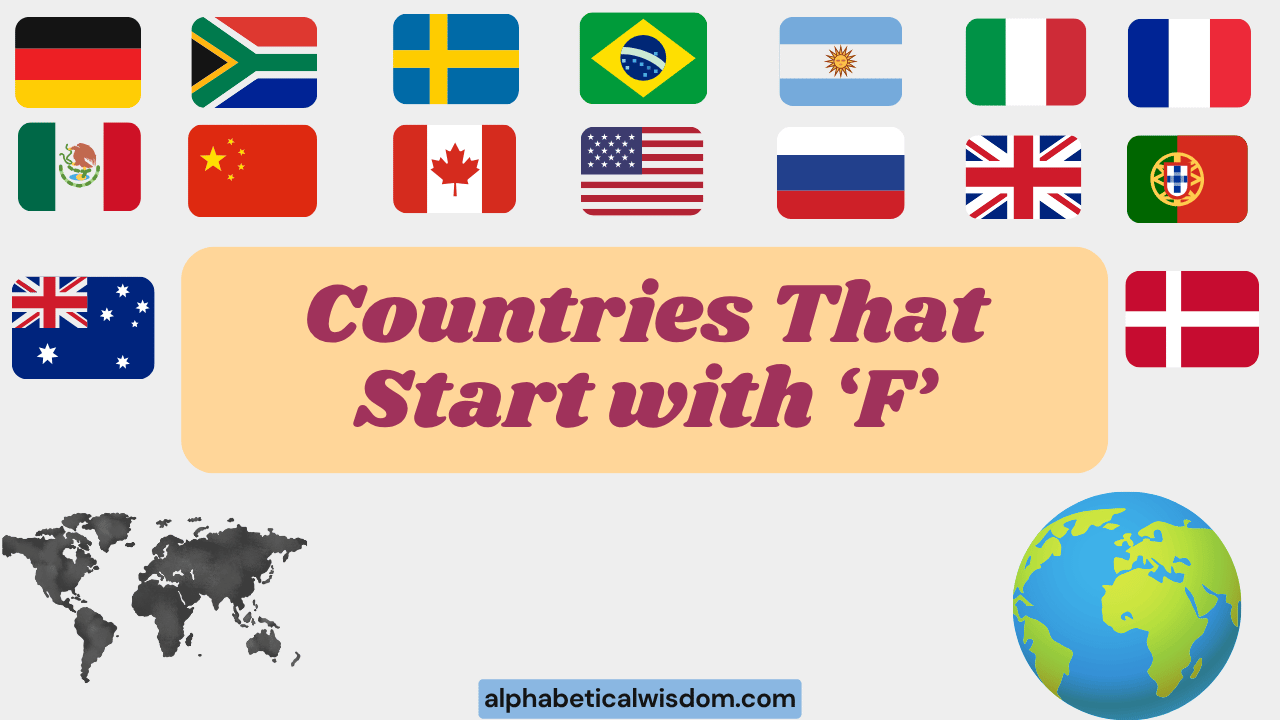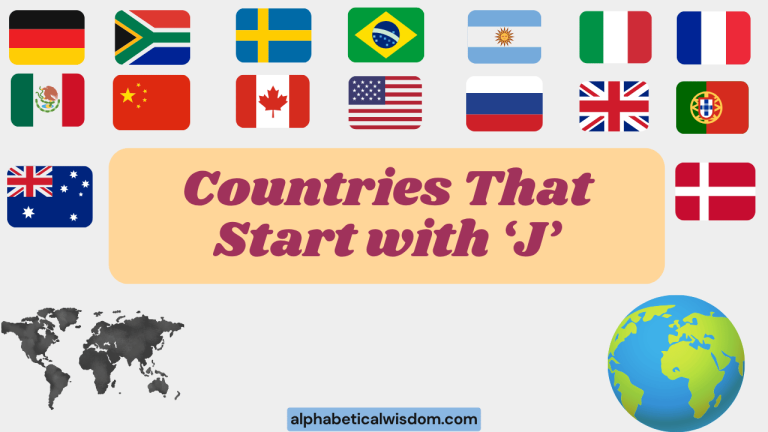Countries Starting With F: A Grammatical Guide
Understanding how to use country names grammatically is crucial for clear and effective communication. This article focuses on countries beginning with the letter “F,” exploring their grammatical properties, usage rules, and common pitfalls.
Mastering these concepts will improve your writing and speaking skills, ensuring accuracy and confidence when discussing international topics. This guide is perfect for English language learners, students, teachers, and anyone who wants to refine their grammar skills.
Table of Contents
- Introduction
- Definition: Countries Starting with F
- Structural Breakdown
- Types and Categories
- Examples
- Usage Rules
- Common Mistakes
- Practice Exercises
- Advanced Topics
- FAQ
- Conclusion
Introduction
Proper grammar is essential for clear and effective communication, and this includes knowing how to use country names correctly. This article will delve into the grammatical aspects of countries whose names begin with the letter “F,” focusing on their usage, associated adjectives, and common grammatical structures.
By understanding these principles, you can improve your written and spoken English, avoid common errors, and communicate more confidently about international topics.
Definition: Countries Starting with F
A country is a distinct territorial body or political entity, typically identified by defined borders, an organized government, and a degree of international recognition. When referring to countries starting with “F” in English grammar, we are concerned with their proper nouns, their usage in sentences, and the adjectives and other related terms derived from them.
These proper nouns function as subjects, objects, or complements within sentences.
The countries that will be discussed are France, Finland, Fiji, and depending on the context, possibly others that may be relevant geographically or historically. Each country has its own associated adjective of nationality (e.g., French, Finnish, Fijian) and specific grammatical conventions that must be followed to ensure accuracy and clarity.
Structural Breakdown
The structural breakdown of using country names in English involves several key elements. First, country names are proper nouns and are always capitalized.
Proper nouns refer to specific entities and require capitalization to distinguish them from common nouns. For example, “France” (a country) is capitalized, while “country” (a general term) is not.
Second, adjectives of nationality are derived from country names. These adjectives describe people, things, or concepts associated with that country.
For example, “French” is the adjective of nationality for “France,” and it can be used to describe something as “French cuisine” or “a French citizen.” These adjectives are also capitalized because they are derived from proper nouns.
Third, prepositions play a crucial role in indicating relationships between countries and other elements in a sentence. Common prepositions used with country names include “in,” “to,” “from,” “of,” and “with.” For example, “I live in France,” or “She traveled to Finland.” The correct preposition depends on the intended meaning and context.
Finally, country names can also appear in compound nouns and idiomatic expressions. Compound nouns combine two or more words to create a new noun, such as “French fries” or “Finnish sauna.” Idiomatic expressions are phrases whose meaning is not deducible from the literal meanings of the individual words, such as “French leave” (meaning to leave without permission or notice).
Understanding these structures is essential for using country names correctly and naturally in English.
Types and Categories
When dealing with countries starting with the letter “F,” it’s useful to categorize them based on their grammatical functions and related terms. This helps to better understand the different ways these countries can be used in sentences and phrases.
Here are the main categories:
Country Names as Proper Nouns
As mentioned, country names are proper nouns and always capitalized. They can function as subjects, objects, or complements in a sentence. For example, “France is known for its cuisine” (subject), “I visited Finland last year” (object), “He is from Fiji” (complement).
Adjectives of Nationality
These adjectives are derived from country names and describe things associated with that country. They are also capitalized. For example, “French wine,” “Finnish design,” “Fijian culture.”
Prepositional Phrases
Country names often appear in prepositional phrases, which provide additional information about location, direction, or relationship. Common prepositions used include “in,” “to,” “from,” “of,” “with,” and “about.” For example, “She lives in France,” “He traveled to Finland,” “They came from Fiji.”
Compound Nouns
Country names can be part of compound nouns, which combine two or more words to create a new noun. These nouns often refer to specific items or concepts associated with the country. For example, “French fries,” “Finnish sauna,” “Fijian dollar.”
Idiomatic Expressions
Some idiomatic expressions include country names, although their literal meaning may not be immediately obvious. Understanding these expressions requires knowledge of their specific cultural or historical context.
An example is “French leave”.
Examples
To illustrate the grammatical concepts discussed above, here are several examples of countries starting with “F” used in various contexts.
General Usage
The following table provides examples of how country names are used as subjects, objects, and complements in sentences. Each sentence demonstrates a different grammatical function and showcases the proper capitalization and usage of country names.
| Sentence | Grammatical Function |
|---|---|
| France is a popular tourist destination. | Subject |
| I have always wanted to visit Finland. | Object |
| He is originally from Fiji. | Complement |
| France has a rich history. | Subject |
| She studied abroad in Finland. | Object |
| The capital of Fiji is Suva. | Complement |
| France is known for its fashion industry. | Subject |
| We flew to Finland for our honeymoon. | Object |
| Their family emigrated from Fiji. | Complement |
| France exports a lot of wine. | Subject |
| He learned to ski in Finland. | Object |
| The official language of Fiji is Fijian. | Complement |
| France borders several European countries. | Subject |
| They explored the forests of Finland. | Object |
| She is a citizen of Fiji. | Complement |
| France is a member of the European Union. | Subject |
| I have friends who live in Finland. | Object |
| He is proud to be from Fiji. | Complement |
| France attracts millions of visitors each year. | Subject |
| She plans to retire in Finland. | Object |
| The culture of Fiji is very vibrant. | Complement |
| France is a major economic power. | Subject |
| We enjoyed our trip to Finland very much. | Object |
| He is a native of Fiji. | Complement |
| France is famous for its art and architecture. | Subject |
| She is studying the language of Finland. | Object |
| The islands of Fiji are stunning. | Subject |
Adjectives of Nationality
This table illustrates the use of adjectives of nationality derived from country names. These adjectives describe people, things, or concepts associated with the respective countries.
Note that adjectives of nationality are always capitalized.
| Sentence | Explanation |
|---|---|
| She enjoys French cuisine. | “French” describes the type of cuisine. |
| He is a Finnish designer. | “Finnish” describes the nationality of the designer. |
| They celebrated Fijian Independence Day. | “Fijian” describes the type of Independence Day. |
| The French Revolution was a significant historical event. | “French” describes the revolution. |
| Finnish saunas are known for their health benefits. | “Finnish” describes the type of saunas. |
| Fijian culture is rich and diverse. | “Fijian” describes the culture. |
| He speaks French fluently. | “French” describes the language. |
| She admires Finnish architecture. | “Finnish” describes the architecture. |
| Fijian music is very rhythmic. | “Fijian” describes the music. |
| The French government is located in Paris. | “French” describes the government. |
| Finnish education is highly regarded. | “Finnish” describes the education system. |
| Fijian hospitality is well-known. | “Fijian” describes the hospitality. |
| She bought a French handbag. | “French” describes the handbag. |
| He is studying Finnish history. | “Finnish” describes the history. |
| They enjoyed a Fijian dance performance. | “Fijian” describes the dance performance. |
| The French flag is blue, white, and red. | “French” describes the flag. |
| Finnish folklore is fascinating. | “Finnish” describes the folklore. |
| Fijian art is very colorful. | “Fijian” describes the art. |
| He is a French chef. | “French” describes the chef. |
| She is a Finnish teacher. | “Finnish” describes the teacher. |
| He is a Fijian doctor. | “Fijian” describes the doctor. |
| The French economy is one of the largest in Europe. | “French” describes the economy. |
| Finnish technology is very advanced. | “Finnish” describes the technology. |
| Fijian tourism is a major industry. | “Fijian” describes the tourism industry. |
| She is a French artist. | “French” describes the artist. |
| He is a Finnish writer. | “Finnish” describes the writer. |
| She is a Fijian singer. | “Fijian” describes the singer. |
Prepositions with Countries
This table demonstrates the use of various prepositions with country names to indicate relationships of location, direction, and association. Choosing the correct preposition is crucial for conveying the intended meaning accurately.
| Sentence | Preposition | Explanation |
|---|---|---|
| She lives in France. | in | Indicates location within the country. |
| He traveled to Finland for a conference. | to | Indicates direction of travel. |
| They came from Fiji. | from | Indicates origin or departure point. |
| The history of France is fascinating. | of | Indicates possession or association. |
| She is friends with people from Finland. | with | Indicates association or companionship. |
| He read a book about France. | about | Indicates the subject of the book. |
| The flight to Fiji was very long. | to | Indicates the destination. |
| She learned a lot in Finland. | in | Indicates the place where she learned. |
| He received a gift from France. | from | Indicates the source of the gift. |
| The culture of Fiji is very vibrant. | of | Indicates possession or association. |
| She collaborated with artists from Finland. | with | Indicates partnership or teamwork. |
| The documentary was about Fiji. | about | Indicates the subject of the documentary. |
| He is currently working in France. | in | Indicates current location. |
| She is planning a trip to Finland. | to | Indicates the destination of the trip. |
| They received a warm welcome from Fiji. | from | Indicates the source of the welcome. |
| The traditions of France are well-preserved. | of | Indicates possession or association. |
| She is studying with experts from Finland. | with | Indicates guidance or mentorship. |
| The movie was filmed about Fiji. | about | Indicates the subject of the movie. |
| He is investing in France. | in | Indicates the place of investment. |
| She is moving to Finland. | to | Indicates the destination of the move. |
| They received a scholarship from Fiji. | from | Indicates the source of the scholarship. |
| The economy of France is strong. | of | Indicates possession or association. |
| She is competing with athletes from Finland. | with | Indicates competition. |
| The lecture was about Fiji. | about | Indicates the subject of the lecture. |
Countries in Compound Nouns
This table shows examples of compound nouns that include country names. These nouns combine two or more words to create a new noun with a specific meaning.
Understanding these compound nouns helps to expand vocabulary and recognize common expressions.
| Compound Noun | Explanation |
|---|---|
| French fries | Fried potato sticks, often served as a side dish. |
| Finnish sauna | A type of sauna originating from Finland, known for its dry heat. |
| Fijian dollar | The currency of Fiji. |
| French toast | Slices of bread soaked in eggs and milk and then fried. |
| French press | A coffee brewing device. |
| French braid | A hairstyle where the hair is braided close to the scalp. |
| Finnish tango | A style of tango dance and music originating from Finland. |
| Finnish Spitz | A breed of dog originating from Finland. |
| Fijian hibiscus | A type of hibiscus flower commonly found in Fiji. |
| Fijian kava | A traditional Fijian drink made from the kava plant. |
Idiomatic Expressions
This table provides examples of idiomatic expressions that include country names. These expressions have meanings that cannot be understood from the literal definitions of the individual words and require knowledge of their specific cultural or historical context.
| Idiomatic Expression | Meaning | Example Sentence |
|---|---|---|
| French leave | To leave without permission or notice, often secretly. | He took French leave from the party. |
Usage Rules
Several rules govern the proper usage of country names in English. Adhering to these rules ensures clarity and accuracy in communication.
Here are the key rules to remember:
- Capitalization: Country names are proper nouns and must always be capitalized. This includes both the full name of the country (e.g., France) and any derived adjectives of nationality (e.g., French).
- Article Usage: In most cases, country names do not require a definite article (“the”). However, there are exceptions, such as when the country name includes words like “Republic,” “Kingdom,” or “States” (e.g., the United States of America, the French Republic).
- Preposition Choice: Select the appropriate preposition based on the context. Common prepositions used with country names include “in,” “to,” “from,” “of,” and “with.” The choice of preposition depends on the intended meaning and the relationship between the country and other sentence elements.
- Adjective Formation: Form adjectives of nationality correctly. These adjectives are typically derived from the country name and are also capitalized (e.g., France → French, Finland → Finnish, Fiji → Fijian).
- Consistency: Maintain consistency in usage throughout your writing or speech. Once you have established a particular form or style, stick to it unless there is a specific reason to change.
There are some exceptions to these rules, particularly with historical or less common country names. It is always best to consult a reliable grammar guide or dictionary if you are unsure about the correct usage.
Common Mistakes
Several common mistakes can occur when using country names in English. Being aware of these errors can help you avoid them and improve your accuracy.
Here are some frequent mistakes and how to correct them:
| Incorrect | Correct | Explanation |
|---|---|---|
| I am going to france. | I am going to France. | Country names should always be capitalized. |
| She is a french citizen. | She is a French citizen. | Adjectives of nationality should be capitalized. |
| He lives at France. | He lives in France. | Use the correct preposition (“in” for location within a country). |
| The France is beautiful. | France is beautiful. | Do not use “the” before most country names. |
| I like finnish sauna. | I like Finnish sauna. | Adjectives of nationality should be capitalized. |
| They are from fiji islands. | They are from Fiji. | Country names should always be capitalized. |
Practice Exercises
To reinforce your understanding of the grammatical concepts covered in this article, here are some practice exercises. These exercises will help you identify and correct common errors and improve your overall accuracy in using country names correctly.
Exercise 1: Fill in the Blanks
Fill in the blanks with the correct form of the country name or adjective of nationality. Choose from France, French, Finland, Finnish, Fiji, or Fijian.
| Question | Answer |
|---|---|
| 1. Paris is the capital of __________. | France |
| 2. He speaks __________ fluently. | French |
| 3. Helsinki is located in __________. | Finland |
| 4. __________ saunas are very popular. | Finnish |
| 5. Suva is the capital of __________. | Fiji |
| 6. __________ culture is rich and diverse. | Fijian |
| 7. __________ cuisine is world-renowned. | French |
| 8. __________ education system is highly regarded. | Finnish |
| 9. He is a citizen of __________. | Fiji |
| 10. __________ is a member of the European Union. | France |
Exercise 2: Correct the Sentences
Correct the following sentences, which contain errors in the use of country names or adjectives of nationality.
| Question | Answer |
|---|---|
| 1. she is from france. | She is from France. |
| 2. he speaks finnish language. | He speaks Finnish. |
| 3. i want to visit fiji islands. | I want to visit Fiji. |
| 4. the france is a beautiful country. | France is a beautiful country. |
| 5. she likes french’s wine. | She likes French wine. |
| 6. he is a finnish person. | He is Finnish. |
| 7. they are going to the fiji. | They are going to Fiji. |
| 8. the capital of finland is helsinki. | The capital of Finland is Helsinki. |
| 9. she bought a french bag. | She bought a French bag. |
| 10. he enjoys to eat fijian food. | He enjoys eating Fijian food. |
Exercise 3: Sentence Construction
Construct sentences using the given country names and adjectives of nationality in the specified context.
| Prompt | Example Answer |
|---|---|
| 1. France (subject) + famous | France is famous for its Eiffel Tower. |
| 2. Finnish (adjective) + design | Finnish design is known for its simplicity and functionality. |
| 3. Fiji (prepositional phrase with “in”) + live | They live in Fiji. |
| 4. French (adjective) + cuisine | French cuisine is considered one of the finest in the world. |
| 5. Finland (object) + visited | She visited Finland last summer. |
| 6. Fijian (adjective) + culture | Fijian culture is rich in traditions and customs. |
| 7. France (prepositional phrase with “from”) + came | He came from France. |
| 8. Finnish (adjective) + language | The Finnish language is unique and challenging to learn. |
| 9. Fiji (complement) + is | That island is Fiji. |
| 10. French (adjective) + history | French history is filled with significant events. |
Advanced Topics
For advanced learners, there are more complex aspects to consider when using country names. These topics involve historical context, political nuances, and subtle grammatical variations.
Historical Names and Changes
Some countries have undergone name changes or have historical names that are still used in certain contexts. Understanding these changes and historical references can add depth to your understanding of language and culture.
For example, knowing the historical context of “Gaul” when referring to France can provide additional insight into literature and historical texts.
Political Context
The political context can also influence the way country names are used. For instance, referring to a country by its official name (e.g., the French Republic) may be more appropriate in formal or official settings.
Awareness of these nuances can help you communicate more effectively and avoid potential misunderstandings.
FAQ
Here are some frequently asked questions about using country names in English, along with detailed answers to address common concerns and uncertainties.
- Why are country names always capitalized?
Country names are proper nouns, which refer to specific, unique entities. Capitalization distinguishes them from common nouns and indicates their special status. This rule applies universally in English grammar for all proper nouns, including names of people, places, and organizations.
- When should I use “the” before a country name?
Generally, you do not use “the” before a country name. However, there are exceptions when the country name includes words like “Republic,” “Kingdom,” or “States” (e.g., the United States of America, the French Republic). The presence of these descriptive terms necessitates the use of the definite article.
- How do I form the adjective of nationality for a country?
Adjectives of nationality are typically derived from the country name. For example, France becomes French, Finland becomes Finnish, and Fiji becomes Fijian. These adjectives are also capitalized because they are derived from proper nouns. There are some irregular forms, so it’s always a good idea to check a dictionary if you’re unsure.
- Which prepositions should I use with country names?
Common prepositions used with country names include “in,” “to,” “from,” “of,” and “with.” The choice of preposition depends on the intended meaning. “In” indicates location within a country, “to” indicates direction of travel, “from” indicates origin, “of” indicates possession or association, and “with” indicates association or companionship.
- What are some common mistakes to avoid when using country names?
Common mistakes include failing to capitalize country names or adjectives of nationality, using the wrong preposition, or incorrectly using the definite article “the.” Always double-check your writing for these errors to ensure accuracy.
- Are there any exceptions to the rules for using country names?
Yes, there are some exceptions, particularly with historical or less common country names. Some historical names may still be used in certain contexts, and some country names may have irregular adjective forms. When in doubt, consult a reliable grammar guide or dictionary.
- How does political context affect the use of country names?
The political context can influence the way country names are used. In formal or official settings, it may be more appropriate to use the official name of the country (e.g., the French Republic). Awareness of these nuances can help you communicate more effectively and avoid potential misunderstandings.
- Why is it important to use country names correctly in English?
Using country names correctly is essential for clear and effective communication. Proper grammar conveys respect for the countries and cultures being discussed, avoiding misunderstandings and demonstrating a strong command of the English language.
- Can country names be used in compound nouns?
Yes, country names can be part of compound nouns, which combine two or more words to create a new noun. These nouns often refer to specific items or concepts associated with the country, such as “French fries” or “Finnish sauna.”
- What are idiomatic expressions involving country names?
Idiomatic expressions that include country names have meanings that cannot be understood from the literal definitions of the individual words. An example is “French leave,” which means to leave without permission or notice. Understanding these expressions requires knowledge of their specific cultural or historical context.
Conclusion
Understanding the grammatical rules governing the use of country names, particularly those starting with the letter “F,” is essential for clear and accurate communication. This article has covered key aspects such as capitalization, adjective formation, preposition usage, and common mistakes to avoid.
By mastering these concepts, you can improve your written and spoken English, avoid misunderstandings, and communicate more confidently about international topics.
Remember to always capitalize country names and their associated adjectives, choose the correct prepositions, and be aware of exceptions and idiomatic expressions. Consistent practice and attention to detail will help you refine your skills and ensure accuracy in your language use.
Keep practicing and consulting reliable resources to further enhance your understanding and proficiency.






